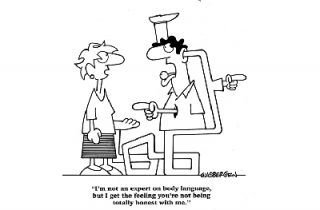In a recent post on authentic leadership we talked about the pitfalls of thinking that you can ‘fake it till you make it’. At Leaders Lab we don’t believe you can pretend to be what you’re not, in order to magically transform yourself into a great leader. The key is to focus on those traits in your personality that could unlock your skills as a leader in an authentic way.
So this remains one of our fundamental principles when we’re coaching anyone who wants to be a better leader. However I recently watched a fascinating TEDtalk by Amy Cuddy about body language and what she refers to as ‘non verbals’. In this talk Amy explores the science of body language and the impact that it can have on the way we feel, not just about others, but most importantly about ourselves. Watch it here:
[embedvideo type=”youtube” id=”Ks-_Mh1QhMc”]
We all know that body language governs how other people think and feel about us. If you sit in a meeting with your hand against your neck, making yourself as small as you can, you are giving out subliminal messages of a lack of authority, gravitas and power. At the other end of the spectrum if you take up as much physical space as possible, spreading out your papers on the table in front of you, and stretching your hands behind your head, it’s very clear to you and to others that you see yourself as dominant and powerful, possibly even to the point of being aggressive.
So we know about the impact that our body language has on others, but what about if our body language governs how we think and feel about ourselves? When you smile, for example, you release endorphins. That would seem logical, but it’s also been proved that if you hold a pen in your mouth for two minutes, the sheer act of doing this also releases endorphins.
Is it possible therefore, to assume and hold a ‘powerful’ open posture that subsequently makes you feel more confident and assertive? According to the scientific data this is the case. Experiments have been carried out measuring testosterone levels in saliva before and after adopting and holding ‘powerful’ body language for a couple of minutes. The results would suggest that you can alter the way you feel about yourself in certain situations (such as before going into an important meeting), by consciously choosing your behaviour and body language before you enter the room. The hypothesis seems to be that you can actually change the way you feel about yourself by doing this.
So although it seems counter intuitive, the body language you adopt can create the positive feelings, rather than waiting for the positive feelings to generate the body language.
[callout title=”What does your body language say?” button=”Discover more” link=”/coaching-mentoring-programmes/” buttoncolor=”white, yellow, orange, red, blue, green, gray, black, alternative-1, alternative-2, alternative-3″ target=”_blank or _self”]Become a better leader through our Coaching Programmes[/callout]
